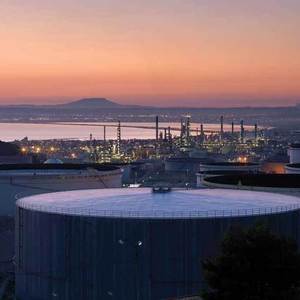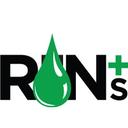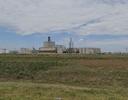Total prepares to begin operations at La Mède biorefinery

Photo: Total S.A.
May 23, 2019
BY Ron Kotrba
French multinational oil giant Total S.A. is just days away from a much-anticipated startup at its La Mède biorefinery in the south of France. A representative of Total told Biodiesel Magazine that the renewable diesel processing facility is on track to begin commercial production in late May or June. The facility has been besieged with delays and controversy over its planned use of imported palm oil.
In 2015 Total announced plans to convert the underperforming and unprofitable oil refinery in La Mède to produce 500,000 tons per year (approximately 170 MMgy) of hydrotreated vegetable oil (renewable diesel) using Axens’ Vegan process technology. Total planned to phase out petroleum crude processing by the end of 2016 and begin construction on the biorefinery conversion project in early 2017.
Completion of the project was initially expected by mid-2017, Philippe Billant, project director for Total and the head of the La Mède transformation, told Biodiesel Magazine in 2015. The company did not receive its operating license for the biorefinery until May 2018, soon after which Total was expected to begin production at the site.
In October 2018, Total advised it would delay startup of the biorefinery again until Q1 2019. Now, well into Q2, the facility is finally ready to begin production.
The biorefinery’s anticipated use of palm oil as one of many feedstocks has caused strong controversy in France. Last year, France’s Federation of Oilseed and Protein Producers (FOP) stated that Nicolas Hulot, France’s Minister for Ecological and Inclusive Transition, capitulated by “validating the choice of deforestation imported from palm oil …, by sacrificing French rapeseed … [and] by telling the EU member states that France has made its choice—it will continue to import palm oil in defiance of the Paris Agreement and global warming…”
Advertisement
Of Total’s receipt of an operating license and planned use of palm oil, Arnaud Rousseau, president of FOP, said in 2018, “This decision is incomprehensible. In addition to its ecological nonsense, it is a slap against our sector. It marks a break, a renunciation of the agricultural ambition carried by the government. Farmers do not deserve such contempt.”
On May 31, 2018, France’s largest farmers’ union, Fédération nationale des syndicats d'exploitants agricoles, called on farmers and consumers to block strategic sites beginning June 10 to protest the “profound injustice” of the matter.
Total stated it has committed to advocating for a “high-quality sustainable certification system” for the EU, such as the International Sustainability & Carbon Certification, or any other equivalent certification recognized by the European Commission.
“To that end,” the company stated in 2018, “a dedicated team has been set up to oversee compliance with sustainability criteria across the entire supply chain, making sure in particular that supplies are purchased from Roundtable on Sustainable Palm Oil-certified producers.”
Advertisement
“La Mède is authorized to use up to 450,000 tons of raw vegetable oil for its feedstock supply,” Total stated last year. “Total has noted the controversy stirred up by erroneous reports that crude palm oil could account for as much as 450,000 tons a year, or nearly 70 percent, of the site’s feedstock. The conflation between vegetable oil and palm oil prompted the group to spell out in more detail the supply plan, worked out with the French Ministry for Ecological and Inclusive Transition that it has committed to follow.”
Total says its feedstock supply mix will consist of 60 to 70 percent raw vegetable oil from palm, rapeseed, sunflower, carinata and soybean oils, as well as distillers corn oil. The other 30 to 40 percent of the converted refinery’s feedstock will come from animal fat, used cooking oil and residues from waste or the pulp and paper industry. “That share is expected to grow over the years based on the availability of such alternative resources,” Total stated in 2018.
Last year the company said it will “pursue a continuous improvement process” following constructive discussions with the French Ministry for Ecological and Inclusive Transition, pledging to restrict crude palm oil to less than half of the feedstock to be processed at La Mède—or no more than 300,000 tons per year.
“This commitment could not have been made without the work done to develop and promote the use of products from the circular economy, in particular by recycling animal fat,” Total stated last year. “Animal fat could comprise 100,000 tons per year or more of the site’s feedstock, higher than planned when the project first began. This demonstrates Total’s sensitivity to concerns about deforestation.”
The conversion project is estimated to cost approximately 275 million euros.
Related Stories
Biodiesel capacity in the U.S. and Canada dipped slightly stable in 2024, with several renewable diesel producers reporting headwinds and lower margins alongside a drove of SAF projects in various stages of development.
The IEA’s Task 39 group has new research regarding the development and status of the sustainable aviation fuel industry.
The U.S. EPA on Nov. 16 released updated RIN data, reporting that nearly 2.11 billion RINs were generated under the RFS in October, up from 1.81 billion generated during the same month of last year.
Conestoga to host SAFFiRE cellulosic ethanol pilot plant
Conestoga Energy and SAFFiRE Renewables LLC announced on Nov. 16 their agreement for Conestoga to host SAFFiRE’s cellulosic ethanol pilot plant at Conestoga’s Arkalon Energy ethanol facility in Liberal, Kansas.
Officials at Calumet Specialty Products Partners L.P. discussed the company’s proposed plans to boost sustainable aviation fuel (SAF) production at its Montana Renewables biorefinery during third quarter earnings call, held Nov. 9.
Upcoming Events










